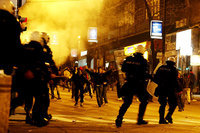Virus of Arab revolutions eats Balkans from within
 The virus of the "Arab revolution" seems to be spreading to Europe. Mass anti-government demonstrations took place in Croatia; there were protesters' clashes with the police. Nationalist trace is visible in these events directly related to the outcome of the war in Yugoslavia 15-20 years ago.
The virus of the "Arab revolution" seems to be spreading to Europe. Mass anti-government demonstrations took place in Croatia; there were protesters' clashes with the police. Nationalist trace is visible in these events directly related to the outcome of the war in Yugoslavia 15-20 years ago.
A rally with thousands of participants gathered in Zagreb on Tuesday. The participants demanded the resignation of Prime Minister, leader of the Conservative party Croatian Democratic Union Jadranka Kosor. The main opposition, Socialist Party, was not favored either as the protesters burned its flag in the same way as they have the Conservative banner. The banner of the European Union Croatia is about to become a member of was burnt as well.
Similar actions took place on the Adriatic coast of the country - in Split, Rijeka and other cities. Most of the demonstrators are young people who organized a special group in the social networking site Facebook. Their main demand is to end corruption that has swept over virtually all levels of power.
The Croatian street rage has been ongoing for several days. On February 27 in Zagreb it turned into clashes of protesters with the police. The protesters, including many football fans, have tried to march along the city in an unauthorized "march of the discontent," but the police stopped the procession. In the ensuing clashes 50 people were injured.
A day earlier there were unrests at the center of Zagreb. There was a large meeting of Croatian War Veterans of 1991-1995. The demonstrators protested against the release of Serbian Croat Tihomir Prud, a suspect in the atrocities committed against Serbs. In addition, the veterans have expressed extreme dissatisfaction with the corruption and low living standards.
Can the events in Croatia be compared to those unfolding in North Africa? The comparison is far-fetched. In this case, it is not a Muslim country. No one had been in power in Croatia for 30 years, like Hosni Mubarak. The independent country has been around for only 20 years. You can hardly find a Croat living on two dollars a day. Nevertheless, there are some commonalities here.
Many people who came to Tahrir Square in Cairo complained about corruption at the top level. In Croatia the corruption has clearly not reached the magnitude similar to Egypt or Tunisia. However, there is its own powerful anti-hero in this former Yugoslav country. This is Ivo Sanader, who in the mid 1990's served as head of administration of the country's first president, Franjo Tudjman.
In the middle of last year, Sanader was expelled from the ruling Croatian Democratic Union. Almost immediately the police began to investigate a large-scale bank fraud carried out by people from his entourage. Very quickly investigators filed a case in respect of the former prime minister, accusing him of laundering three million euros.
The scandal with Sanaderhas quickly become international. The politician tried to escape to Austria, where he used to live in his younger years. However, local police have detained him. A criminal case was opened against the politician on money laundering through one of the Tyrolean banks. At home he faces up to ten years in prison.
If it was limited to Sanader only, the people would hardly go into the streets. However, the authorities have nothing special to brag about apart from corruption scandals. For many years the country has been knocking on the door of the European Union. Croatia was deemed nearly ready for the EU membership;yet, the date of the long-awaited EU entry has not been named. Can membership in NATO be considered an achievement? The NATO does not have the same "charisma" in people's eyes.
What about the socio-economic area? Croatia seems to be earning a good living with its stunning resorts - Dubrovnik, Split, and Zadar. However, the revenue from tourism is clearly insufficient. The Adriatic Sea is not the tropics, and hot weather does not stay there year round. Jobs are lacking. Unemployment is nearly at 20 percent, hundreds of thousands of Croats work in Germany, Austria, Switzerland, Sweden and the former Yugoslav republic of Slovenia.
"The population of Croatia does have the cause for discontent," Sergei Romanenko, an expert on the former Yugoslavia with the Institute of Economics said in an interview with Pravda.ru. "One of these reasons is economic failures. The country is still heavily affected by the consequences of the transition undertaken approximately 20 years ago. Croatian Democratic Union, whose representatives have been in power almost uninterruptedly, is responsible for all these failures in the economy.
Many thought that it would not take longto recreate the high quality of life in Croatia, similar to that of the socialist Yugoslavia in the 1970s. Alas, this was not the case. The difficult situation was aggravated by the current crisis. Unemployment has reached significant levels. Many in the former Yugoslavia (including Croatia) thought that the European Union will be paradise on earth. Today this myth has crumbled.
The attention is drawn to the fact that these statements are largely nationalistic. The war has ended only recently, and this virus has not been eliminated in Croatia as well as in most other republics of Yugoslavia. The war veterans of 20 years ago are dissatisfied with their current situation and reductions in benefits. They went out into the streets and started rallies.
Croatian people have gradually become disillusioned in all major political parties. Today they are more like public relations projects, rather than the forces leading a real political battle with each other. This makes the people burn the flags of all the major parties. However, the president Ivo Josipovic will not repeat Mubarak's fate. Nobody is going to overthrow him."
It would seem appropriate to compare current events in Croatia with mass protests in Latvia, Lithuania, Hungary, Bulgaria and Iceland two and three years ago. These countries have also been hit hard with the crisis, and the critical mass of discontent has matured quickly. The Croats were slower, but their turn has come. Their expectations were not met, the authorities were powerless before the crisis, and there is not much hope for the EU.
The dream of an independent, prosperous Croatia, rushing at full speed to the club of the elected to the European Union, has fallen apart. Now we have to wait and see where else in Europe people will come out into the streets. The people in European countries have enough reasons for discontent with the economic and national politics. They may have even more reasons than the peoples of the Arab East, but a different temperament.
Vadim Trukhachev
Pravda.Ru
Subscribe to Pravda.Ru Telegram channel, Facebook, RSS!




